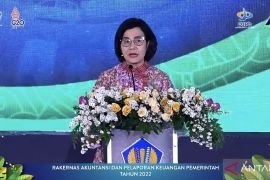The reason is that the legal politics contained in the Criminal Code are aimed at respecting and upholding human rights based on the ideals of Pancasila (the Five Principles), Bhinneka Tunggal Ika (Unity in Diversity), the Unitary State of the Republic of Indonesia, and the 1945 Constitution.
"We certainly respect the United Nations (UN) concern on equality, privacy, religious liberty, and journalism issues. On that basis, the criminal code regulates all of them by paying attention to the balance between human rights and human obligations," Albert Aries said in his written statement, Thursday .
He underlined that the Criminal Code does not discriminate against women, children, and other minority groups, as well as the press.
"All related provisions come from the previous Criminal Code which has been adapted as much as possible to the missions of decolonization, democratization, and modernization carried out by the Criminal Code," he explained.
One example is the adoption of Article 6 letter d of Law Number 40 of 1999 on the Press into the Elucidation of Article 218 of the Criminal Code so that criticism is not punished because it is a form of supervision, correction, and advice on matters relating to the public interests.
According to Albert, it is also incorrect to say that the Criminal Code legitimizes negative social attitudes towards adherents of minority beliefs.
Related news: Minister confirms no major cancellations in foreign tourist visits
"The regulation of criminal acts against religion and belief in the Criminal Code has been reformulated by taking into account the International Covenant on Civil and Political Rights (ICCPR), as inputs from the civil society," he said.
In the formulation of the Criminal Code, meaningful participation as the fulfillment of civil societies' rights to be heard, explained, and considered has been given as much as possible.
"The reason behind the decision to pass the Criminal Code whose reform has been started from 1963 is not time target but the need to update the criminal law and penal system," he said.
According to Aries, as a sovereign rule-of-law state, Indonesia will always respect and consider inputs from civil societies that have met with UN envoys in Europe.
To respect the universal law principles, the Criminal Code has even adopted the substance of the Convention for the Protection of Human Rights and Fundamental Freedom (Treaty of Rome 1950), he added.
"The Criminal Code also adopted the International Covenant on Civil and Political Rights (the New York Convention 1966) and the Convention against Torture and Other Cruel, Inhuman or Degrading Treatment or Punishment 10 December 1984," he said.
Related news: Govt outreach tourism sectors following false news of adultery article
There is Nothing to Worry About
Albert Aries also clarified the fundamentally misleading news related to the adultery article, which is considered to harm Indonesia's tourism and investment sectors.
"The adultery article in the new Criminal Code that takes effect three years after its stipulation is an absolute criminal complaint. This means that only the husband or wife (for those bound by marriage) or the parents or children (for those not bound by marriage) can make a complaint. No one else can report or take the law into their own hands. There will be no legal process without a complaint from the entitled and directly harmed parties," he said .
According to Albert Aries, there are no substantive changes related to the article when compared to Article 284 of the old Criminal Code.
The difference lies only in the addition of parties with the right to complain. Even if it is finally proven, there is an alternative fine of not more than Rp10 million.
“So, there is nothing to worry about. If tourists and investors can be comfortable in Indonesia during this time, then this condition will remain," said Albert.
He said it is natural that Indonesia wants to respect the country's marriage values through this article, as long as the arrangement also does not violate the private space of the community including incoming tourists and investors.
In addition to the absolute criminal complaints, the Criminal Code does not oblige the party entitled to complain to exercise their rights.
"Complaints also cannot be sorted. It means it is impossible to process only one of the perpetrators. The decision to make the complaint will also definitely be considered by those who have the right to complain," he said.
He asserted the new Criminal Code also never provides additional administrative requirements to businesses in the field of tourism to ask about anyone's marital status.
"Foreign investors and tourists do not need to worry about investing and traveling in Indonesia, because the private space of the community is still guaranteed by the law, of course, without reducing respect for Indonesian values. So please come and invest in remarkable Indonesia," he said.
Related news: Govt must ensure new Criminal Code does not hurt people: Legislator
Previously, the Indonesian House of Representatives (DPR RI) passed the Draft Law on Criminal Code into law on Tuesday, Dec. 6.
The decision was taken in a plenary meeting chaired by the Indonesian House of Representatives Deputy Speaker Sufmi Dasco Ahmad.
*The views and opinions expressed on this page are those of the author and do not necessarily reflect the official policy or position of the ANTARA News Agency.
Related news: New Criminal Code not expected to affect tourism investment: Uno
Related news: Will coordinate Criminal Code Article 424 enforcement with police: Uno
Copyright © ANTARA 2022










